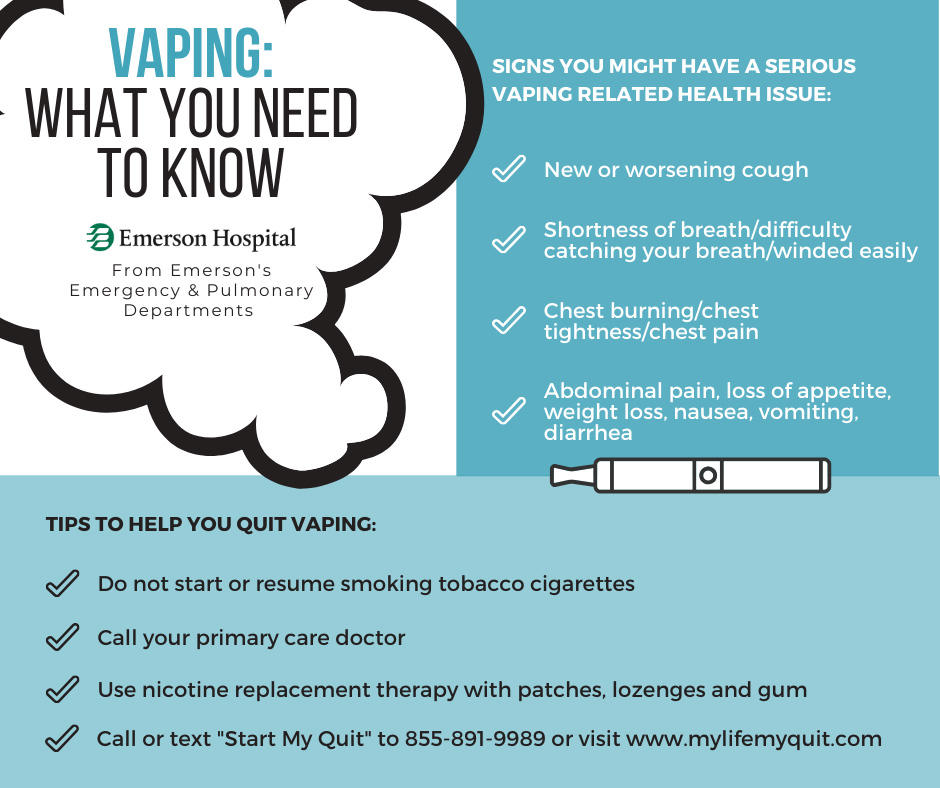
Emerson Hospital’s most recent 2020 Youth Risk Behavior Survey of area public middle and high school students found that vaping is the “drug of choice,” especially for high school students.
Multiple deaths have occurred and hundreds of people around the country continue to be hospitalized with e-cigarette, or vaping, product use associated lung injury (EVALI).
So what do parents need to know about vaping? Deborah Greene, MD, FACEP, associate chair of Emerson’s emergency department and mother of a senior at Concord-Carlisle High School, provides these facts:
- E-cigarettes are easy to hide and can often be confused with USB memory sticks. There is typically little smell associated with vaping, making it easier to mask.
- Many teens do not think they are vaping nicotine. However, 100 percent of JUUL vaping products — the most popular brand — do contain nicotine and other chemicals and heavy metals.
- Studies have shown that most “nicotine-free” vaping products actually do contain some nicotine, which is a highly addictive drug.
- Teens who vape put themselves at risk for serious, even deadly, lung disease.
- E-cigarettes can be used to vape other products, including marijuana.
- There is a strong association between vaping and using other substances, such as marijuana and alcohol.
Signs that a child might vape are tough to spot. The best way to find out is to talk with your child about vaping. Subtle clues may include:
- Increased thirst or nosebleeds (vaping dries out the mouth, throat, and nasal passages).
- “Vaper’s tongue”, a condition caused by routine vaping in which flavor perception is lost — children may reach for spicy or salty foods.
Signs of EVALI (e-cigarette, or vaping, product use-associated lung injury) include shortness of breath, coughing, chest pain, stomach pain, nausea, vomiting and diarrhea, fever, and extreme tiredness. See a medical professional if you or a loved one is experiencing these symptoms.
Podcast
Tune into our Health Works Here podcast with Dr. Greene to learn more about vaping and her tips to help someone who may want to quit.
Vaping: What an ER Doctor and Mom of a Teen Needs You to Know
RESOURCES
Click on the links below for resources to learn more about vaping, its effects and risks, and ways to quit or help those who want to stop vaping.
Text, Telephone & Online Chat
- My Life, My Quit — Get free confidential help by phone or text for quitting vaping or other tobacco products from a trained coach. Call 855-891-9989 (7 a.m. to 1 a.m.) or text “Enroll” to 855-891-9989. Learn more at MyLifeMyQuit.com.
- The Truth Initiative’s texting program helps people who want to quit vaping. Text “QUIT” to 202-804-9884. Check out truthinitiative.org for more information on tobacco.
- Smokefreeteen — The website teen.smokefree.gov has great information and resources to help someone quit tobacco products, including online chat and an app. You can also enroll in a texting program. Text QUIT to iQUIT (47848) for cigarettes or SPIT to 333888 for chewing tobacco.
Apps
- Tobacco Free Teens — This mobile app from the MD Anderson Cancer Center provides education and help for quitting smoking. Download Tobacco Free Teens from the App Store.

